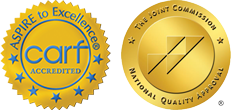Addiction is a loss of control over doing, using, or taking something to the point that it is harmful. It is a treatable mental health condition, but seeking help as soon as possible is crucial for recovery. Recognizing and understanding the signs of addict behavior will allow you to help a loved one before it is too late. Please continue reading to learn more about addictive behavior and how to identify it in family members and friends.
What Is Addiction?
Addiction is a chronic (long-lasting) mental health condition that has a widespread impact on almost every aspect of life, including physical and mental health, relationships, career, and finances. Addictive behavior consists of compulsively seeking a substance or performing an activity despite negative consequences.
It’s important to understand that addiction is a disease, just like high blood pressure or cancer. It is a chronic brain disorder that occurs due to changes in brain chemistry. Addiction does not develop from a lack of willpower or bad decisions.
Addictive substances are very different from each other but have one thing in common – they activate the brain’s pleasure center and reward pathways and create intense feelings of happiness or euphoria. Over time, people using these substances develop cravings and cannot function without them.
When Does Addiction Start?
Addiction starts with substance use, i.e., using an illegal substance or misusing a legal substance. For example, you may use marijuana or heroin a few times, take someone else’s prescription drug, smoke a few cigarettes, or drink alcohol occasionally – this does not mean you have an addiction to these substances. However, these behaviors can lead to addiction.
Some substances are more addictive than others, for example, crack cocaine and heroin. Using these substances only once or twice can rapidly progress to addictive behaviors and substance use disorders (SUDs). SUDs range in severity from mild to moderate to severe. Addiction refers to the most severe form of a substance use disorder. Both genetic and environmental factors can increase the risk of addiction.
What Is the Difference Between Addiction and Dependence?
Addiction is the compulsive use of a substance despite negative consequences. It is characterized by behavioral changes that occur due to alterations in brain chemistry after continued substance use. People with an addiction make substance use their priority, despite the harm it is causing. They act irrationally to obtain and use the substance to which they are addicted.
Dependence refers to a physical reliance on a substance. It means that, over time, a person needs more and more of the substance to get the same effects – this is called tolerance. Dependence is also characterized by withdrawal symptoms, which are uncomfortable and potentially dangerous symptoms that develop when a person attempts to quit using a substance after using it for a long time. Withdrawal symptoms occur because the person’s body and brain get used to a substance and become dependent on it to function.
It is possible to have a dependence on a substance without being addicted. However, in people with a physical dependence, addiction is usually right around the corner. This is because withdrawal symptoms can trigger compulsive, drug-seeking, addictive behaviors.
Therefore, substance abuse, addiction, and dependence depend on the time and degree of substance use.
- Using an illegal drug once or twice qualifies as substance abuse. This may consist of experimental use of a recreational drug in social situations, for example.
- In some people, the drug use becomes more frequent. Using an illicit drug regularly and needing more of it over time to get the same effects (tolerance) or experiencing unpleasant symptoms (withdrawal) when the drug is not available is called dependence.
- As the drug use increases, it can become increasingly difficult for a person to go without the drug. Using the drug compulsively, despite negative consequences, is called an addiction.
Can Addiction Be Genetic?
Addiction is a complex condition that develops due to a combination of environmental and genetic factors. There is a known heritable component to addict behavior. Studies have found that the children of alcoholics are about four times more likely than the general population to develop alcohol problems.
Research also indicates that alcohol addiction is approximately 50% inherited and 50% due to external factors. Addiction to some other drugs may be up to 70% heritable. No specific genes linked to addiction have been identified, the presence of which would put a person at risk of developing addictive behaviors. Also, the genetic risk for addiction is not linked to specific substances – rather, it is an overall raised risk of addiction to a variety of substances.
There are also indirect ways in which genetics can play a role in the development of addict behavior. We know that risk-taking or impulsive personalities and anxiety and depression are heritable traits and conditions. They are also known risk factors for addictive behaviors.
More research is needed to fully understand the link between genetics and addict behavior. For example, parents who pass on their genes to their children also raise their children in riskier environments, making it difficult to differentiate between environmental and genetic risks of addiction.
Signs of Addict Behavior
Physical Signs of Addict Behavior
- Needing to use the drug regularly (daily or several times a day).
- Experiencing intense urges or cravings for the drug that are all-consuming and block out rational thinking.
- Always ensuring there is a constant supply of the drug.
- Needing more of the drug, over time, to get the same effects.
- Taking more of the drug or using it for a longer time than intended.
- Spending inordinate amounts of time procuring and using the drug and recovering from its effects.
- Attempting to quit using the drug and failing due to cravings.
- Experiencing withdrawal symptoms with attempts to quit.
- Developing physical symptoms such as dry mouth, red eyes, blurred vision, headaches, nausea, infections, weakness, dehydration, dilated or pinpoint pupils, impaired thinking and judgment, confusion, insomnia, nightmares, changes in appetite and weight, compulsive movements, tremors, and other physical symptoms.
- Suffering a drug overdose.
Behavioral Signs of Addict Behavior
- Escalating use of the drug or changing how the drug is used (for example, going from snorting or smoking it initially to injecting the drug to get a more rapid effect).
- Running out of prescriptions early or prescription shopping from multiple doctors.
- Spending money on procuring the drug, despite financial hardships.
- Falling short on school, work, or family responsibilities.
- Cutting back on socializing and recreational activities in order to use the drug.
- Continuing to use the drug even when it is causing health and other problems.
- Engaging in illegal behaviors, such as theft, to pay for a drug habit.
- Doing risky activities such as driving under the influence.
- Being secretive, lying about drug use, and becoming defensive when questioned.
- Behaving differently when using the drug versus when sober.
Psychological Signs of Addict Behavior
- Lacking energy and motivation.
- Neglecting one’s appearance.
- Experiencing mood swings, such as irritability, restlessness, or aggression.
- Developing symptoms of anxiety, panic attacks, or depression.
- Exhibiting paranoia, delusions, or hallucinations.
What Are the Different Types of Addictions?
The term addiction is commonly associated with drugs, alcohol, smoking, and gambling, but people can become addicted to just about anything, including shopping, work, sex, and the internet. There are two main categories of addictions – substance use disorders and behavioral addictions.
Alcohol, nicotine, and marijuana are the most common substance addictions in the US.
Drug Addiction
Drug addiction refers to using illegal substances or misusing legal substances. Illegal drugs include hallucinogens (LSD), sedative hypnotics (benzodiazepines or sleeping pills), inhalants (aerosol sprays, paint thinners, nitrites (poppers), or gases), illicit opioids (heroin), and stimulants (cocaine, methamphetamine). Prescription drugs that are misused and abused include prescription opioids (oxycodone, hydrocodone) and prescription stimulants (ADHD medications).
Alcohol Addiction
The term alcohol use disorder (AUD) encompasses alcohol abuse, alcohol dependence, alcohol addiction, and alcoholism. It is the most common form of substance addiction in the United States. Approximately 29.5 million people in the US have alcohol use disorder (AUD), representing 10.5% of the population aged 12 years and older. AUD is characterized by the inability to stop or control alcohol use despite negative health, occupational, and social consequences.
It can be challenging to differentiate between social drinking and harmful patterns of alcohol consumption in a loved one. It is even more difficult to recognize alcohol abuse and addiction in functioning alcoholics (people who maintain a semblance of normalcy while drinking unhealthy amounts of alcohol). Some of the signs to look for in a potential alcoholic are listed below.
Common Characteristics of an Alcoholic
Prioritizing Alcohol
People with an addiction to alcohol frequently place drinking above all other parts of their life. For example, a person might choose to stay home alone and drink rather than go to a social gathering where alcohol will not be available. Or someone with an alcohol problem may neglect work duties or family responsibilities to drink or recover from the effects of alcohol.
Blaming Others
It is common for people who are abusing alcohol to be in denial. They are quick to place the blame on other people or external factors to explain their unhealthy drinking habits. For example, a person may say their boss is working them too hard and they need to relax by drinking. Or they may blame relationship problems as the reason for their excessive drinking.
Making Excuses
Addict behavior includes rationalizing or making excuses for the excessive alcohol consumption to mask the severity of the problem. For instance, someone with an alcohol addiction might insist they only drink on weekends or after a long day at work.
Drinking Uncontrollably
People who are struggling with alcohol dependence and addiction often end up drinking more or for longer than they intended. They lose track of time when they’re drinking. They are unable to stop drinking despite multiple attempts to quit and repeatedly relapse to their old drinking habits.
Do you have a loved one struggling with addiction?
We know how hard that can be. Give us a call to find out what options you have.
Experiencing Financial Difficulties
Alcohol use disorder can lead to financial problems for several reasons, including money spent on buying large quantities of alcohol, neglecting work responsibilities, making poor financial decisions, and needing costly treatment for health issues related to alcohol use.
Behaving Recklessly
Engaging in reckless behavior while under the influence is one of the most common characteristics of alcoholics. People often drink and drive, practice unsafe sex, or put themselves and others in dangerous situations while intoxicated.
If you see these addictive behaviors in a loved one, you should get help sooner rather than later. Professional addiction treatment with evidence-based modalities such as detoxification, medication-assisted treatment, and behavioral therapies are proven to help people with even severe addictions overcome their problems and lead sober lives.
What is alcoholic psychosis?
People with alcohol addictive behaviors can develop symptoms of psychosis (altered thinking) during or shortly after heavy alcohol use. The symptoms of alcohol-related psychosis resemble schizophrenia and can include fear, paranoia, delusions, and hallucinations. Treatment for alcoholic psychosis may require management in the hospital, including benzodiazepines for sedation and suicide prevention measures.
How do you know you are dating an alcoholic?
You should suspect you are dating an alcoholic if your partner displays the following signs:
- Drinks heavily and regularly.
- Spends a lot of time drinking.
- Often drinks alone.
- Avoids social activities that don’t include drinking.
- Has a different personality when drinking and when sober.
- Struggles with poor work performance, financial issues, or legal troubles.
- Has a history of alcohol abuse in their family.
If you’re not sure whether your partner is an alcoholic, it’s better to err on the side of caution and seek professional help. A therapist can help you understand the situation and guide you towards appropriate addiction treatment options, if needed.
Nicotine/Tobacco Addiction
Tobacco use is the leading preventable cause of disease, disability, and death in the US. People who smoke cigarettes or electronic cigarettes (e-cigarettes or vaping) can develop a nicotine dependence. This means they struggle to stop using nicotine, the addictive chemical in tobacco products.
Addict behaviors in tobacco users include one or more unsuccessful attempts to stop smoking, continued smoking despite health problems related to tobacco use, withdrawal symptoms when trying to stop, and giving up social activities in order to smoke (for example, avoiding restaurants or social gatherings where smoking is prohibited).
Behavioral Addictions
Currently, the only medically recognized behavioral addiction is a gambling disorder. This is a diagnosable condition listed in the Diagnostic and Statistical Manual of Mental Disorders (5th Edition). The DSM-5 includes standard classifications of mental disorders and is used by healthcare professionals in the United States. It does not currently list other behavioral addictions such as overeating, internet, video games, sex, pornography, exercise, shopping, plastic surgery, or risky behaviors (thrill seeking).
However, any activity that becomes all-consuming and impacts your health or ability to function can qualify as a behavioral addiction.
Addictive behavior that points to a gambling problem includes an inability to control the urge to gamble, continued gambling despite negative consequences such as financial losses or job loss, financial problems and bankruptcy, relationship problems, mood changes, anxiety, and depression.
How Does Addiction Affect People and Their Loved Ones?
Addiction affects every aspect of a person’s life, including their physical health, mental health and psychological well-being, spirituality, career, relationships, social interactions, finances, and legal situation.
In addition to the wide-ranging effects on a person who has a substance use disorder, these disorders have negative effects on family members and other loved ones, including:
- The emotional burden of behaviors of addicts, which can cause fear, worry, anger, frustration, embarrassment, shame, guilt, helplessness, and depression in loved ones.
- The economic burden of addiction because of the money spent on purchasing substances, job loss, and other related fiscal problems.
- The stress on relationships caused by addictive behaviors which can result in dissatisfaction, tension, and conflict, and may lead to separation or divorce.
- Abuse and violence in the family unit and/or removal of children from the home by Child Protective Services.
- A risk of neglect or abuse in children living with adults who have a substance use disorder, leading to physical health complications, behavioral difficulties, poor academic performance, and psychiatric issues.
- The negative effects on an unborn baby, including birth defects and developmental abnormalities, when pregnant women use or misuse harmful substances.
How to Deal with Addict Behavior?
It can be extremely challenging to deal with addict behavior in a loved one. The best approach is a combination of understanding and tough love.
The first goal should be to ensure a safe environment for all members of the household. People who have an addiction can be dangerous to themselves and others. If someone you love displays addict behavior, make sure you have a plan in place in case the substance use escalates. Having a support system of friends, family members, therapists, or the police is important. You may need to temporarily leave the home or report the person to law enforcement.
Next, it’s important to understand addiction and the driving forces behind it. Remember, addiction occurs due to changes in brain chemistry, which can be so powerful that your loved one loses control over their substance use, regardless of the physical, emotional, social, financial, and legal consequences. Alcohol and drug cravings can make loved ones do terrible things, and you must find it in your heart to forgive them and help them get better.
So, don’t take your loved one’s addict behaviors personally. This is easier said than done, especially when your loved one is lying, causing financial hardships, and relationship distress because of their substance abuse.
What you can do, however, is not enable addictive behaviors in your loved one. Make sure you:
- Do not purchase an illegal substance for a loved one.
- Do not lie or make excuses to cover for them.
- Do not rationalize their addict behavior.
- Do not bail them out financially.
- Do not clean up their financial, legal, or social messes.
- Do not allow them to blame you for their addiction.
It’s also vital that you practice self-care and stay healthy. You cannot help a loved one with addictive behaviors and substance abuse if you are in poor health yourself. Another thing to keep in mind is that you should not develop unhealthy coping mechanisms, such as turning to substance use yourself to deal with the stress of addict behaviors in a loved one.
What Do I Do If My Loved One is Addicted?
If your loved one has signs of addiction, seeking professional addiction treatment for alcohol or drug abuse can help them overcome this serious problem. Talk to your friend or family member about treatment options, support them in their recovery efforts, and rebuild trust in your relationship. Remember, addiction is a chronic, lifelong condition. Many people who have completed rehab can relapse, even years later. Therefore, it takes continued support from family members and loved ones to stay clean from substance abuse. In addition, support groups are useful resources that can help people stay sober in the long run.
Let Us Help Your Loved One
Living with someone who has addict behaviors or is struggling with substance abuse can be overwhelming. But help is available, and you don’t have to do it alone.
At Discover Recovery Treatment Center in Washington State, we offer personalized addiction treatment plans with multiple levels of care, including medically supervised detoxification, medication-assisted treatment, and behavioral therapies in individual, group, and family settings.
Call us today and find out how we can help your loved one overcome their addictive behaviors, get clean, and reclaim their lives and your family’s future.





